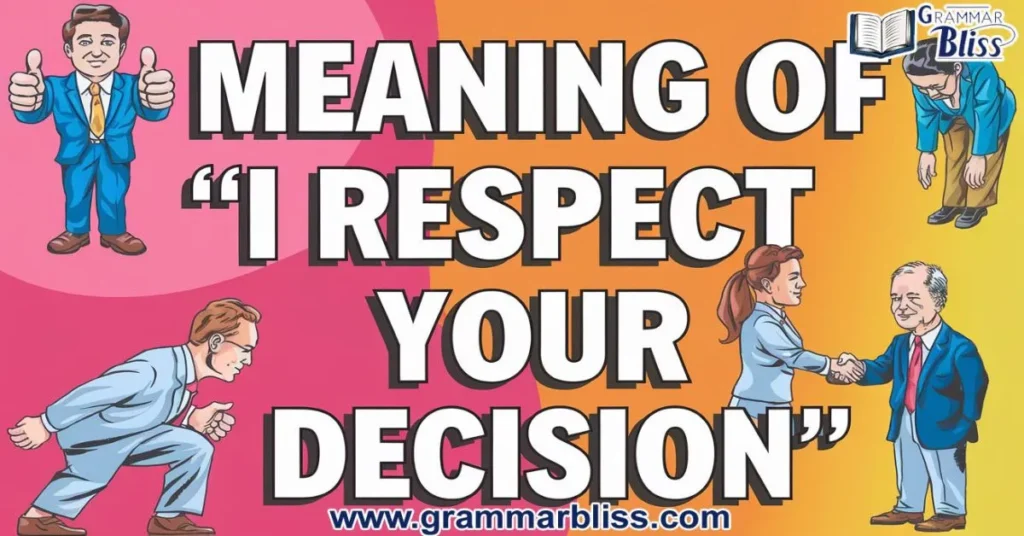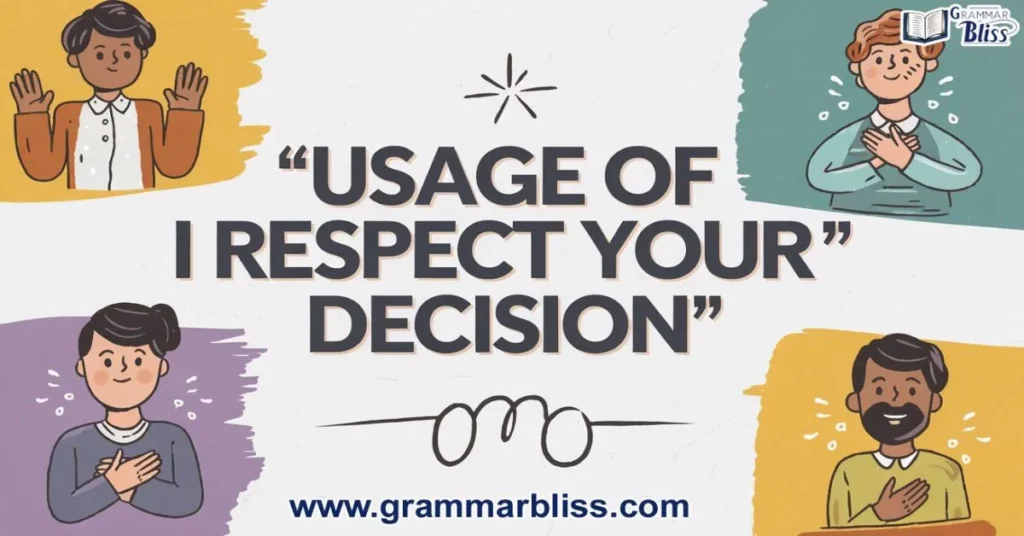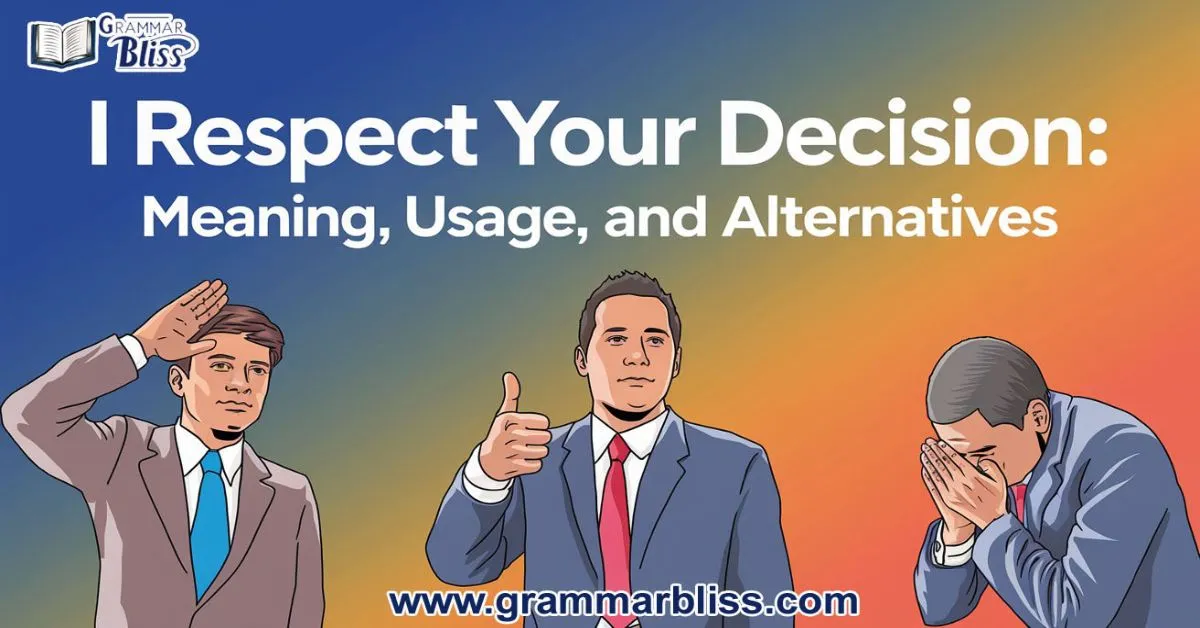In today’s professional world, “I Respect Your Decision” has become a powerful phrase that conveys mutual respect and appreciation in both personal and professional settings. When expressing this sentiment, you acknowledge the other person’s choice and their judgment, even if it differs from your own perspective.
It’s a way to show that you understand their rationale and support their autonomy. Especially in the workplace, where maintaining positive relationships and professionalism is crucial, this phrase helps foster a culture of collaboration and diplomacy. Whether in discussions or disagreements, saying “I respect your decision” ensures clarity, upholds mutual understanding, and keeps communication open.
Quick Summary
In this article, we will explore the meaning of “I respect your decision,” how and when to use it in professional settings, and why it’s important for communication. We will also discuss its professionalism, advantages, and possible downsides. Additionally, we will provide some synonyms and grammar rules to help you better express respect for someone’s judgment. Finally, we’ll address frequently asked questions to help clarify when it’s appropriate to use this phrase.
Read: bearer-or-barer-whats-the-difference/
Meaning of “I Respect Your Decision”

The phrase “I respect your decision” essentially means that you acknowledge and appreciate the reasoning behind someone’s choice, even if you don’t entirely agree with it. It’s a way of showing respect for the person’s autonomy and authority in making a decision. In a professional environment, this is especially important because it helps maintain a collaborative environment. Understanding perspectives and valuing input from others can lead to more effective decision-making and build a sense of trust and mutual respect in the workplace.
When you say “I respect your decision,” you are also indicating that you accept the other person’s judgment, whether you agree with it or not. This phrase shows that you trust their reasoning and believe that their choice is valid in the context of the situation. It also demonstrates that you are willing to support them and follow through with their choice, even if it differs from your own perspective.
Usage of “I Respect Your Decision”

Understanding when to use “I respect your decision” is just as important as the phrase itself. It’s typically used in professional settings where diplomacy and tact are required. For example, if you’re in a meeting and a colleague or superior makes a decision you disagree with, you might say, “I respect your decision” to acknowledge their authority while maintaining a positive relationship. This helps you avoid conflict and keeps the conversation respectful, even if you don’t agree with the decision being made.
This phrase is particularly useful when negotiating or discussing matters with clients or team members. For instance, if a client decides to take a particular direction for their project that doesn’t align with your recommendation, saying “I respect your decision” shows that you value their input and trust their judgment. It can also help smooth over disagreements and encourage collaboration in future interactions.
“I Respect Your Decision” – Is It Professional to Say?
Yes, saying “I respect your decision” is absolutely professional. It reflects maturity and the ability to maintain professionalism in the face of disagreements. When used correctly, it fosters mutual respect and helps preserve positive workplace relationships. This phrase is often used to demonstrate acceptance of a decision made by a superior, a colleague, or a client. In many cases, it’s a way of acknowledging choice without undermining the other person’s authority or expertise.
However, there are certain situations where it might not be the most effective choice. For example, if you overuse this phrase without following up with constructive feedback or a thoughtful discussion, it can come across as passive or disengaged. In some cases, it may feel like you are not actively participating in the decision-making process. It’s important to ensure that your words are backed up by actions that demonstrate your support and commitment to the decision made.
Advantages and Disadvantages of “I Respect Your Decision”
Advantages of Saying “I Respect Your Decision”
Shows Professionalism
Promotes Mutual Respect.
Supports Collaboration
Encourages Open Communication
Enhances Diplomacy
Disadvantages of Saying “I Respect Your Decision”
Can Be Perceived as Passive
May Come Across as Insincere
Lack of Constructive Feedback
Implied Agreement
May Not Address Underlying Issues
Synonyms for “I Respect Your Decision”
To avoid repeating the same phrase too often, there are many other ways to express the same sentiment. Here are some synonyms for “I respect your decision” that you can use depending on the situation:
I Appreciate Your Decision
Meaning: Acknowledging the value of someone’s choice.
Example: “I appreciate your decision to take this direction with the project.”
I Trust Your Judgment
Meaning: Showing confidence in someone’s ability to make decisions.
Example: “I trust your judgment on the new marketing strategy.”
I Support Your Choice
Meaning: Offering approval for someone’s decision.
Example: “I support your choice to prioritize this client.”
Your Decision Makes Sense
Meaning: Acknowledging that the decision is rational and reasonable.
Example: “Your decision makes sense, given the current circumstances.”
I Understand Your Choice
Meaning: Showing comprehension of why a decision was made.
Example: “I understand your choice to delay the project launch.”
I Value Your Perspective
Meaning: Appreciating the thought process behind the decision.
Example: “I value your perspective on this matter.”
I Acknowledge Your Decision
Meaning: Officially recognizing someone’s choice.
Example: “I acknowledge your decision to move forward with the merger.”
I Trust Your Expertise
Meaning: Relying on someone’s knowledge or skill in a specific area.
Example: “I trust your expertise in handling this technical issue.”
You Have My Support
Meaning: Offering full backing for the decision.
Example: “You have my support in implementing the new policy.”
I Respect the Thought Process Behind Your Decision
Meaning: Showing admiration for how a decision was carefully considered.
Example: “I respect the thought process behind your decision to adopt this approach.”
Learn: signor-or-signer-understanding-the-difference-and-proper-usage/
I Acknowledge Your Judgment
Meaning: Recognizing and valuing someone’s decision-making skills.
Example: “I acknowledge your judgment on which vendor we should go with.”
Your Choice is Valid
Meaning: Affirming that the decision is reasonable and justified.
Example: “Your choice is valid, and I can see why you went this route.”
I Accept Your Decision
Meaning: Indicating that you are comfortable with and will follow the decision.
Example: “I accept your decision and will adjust the plan accordingly.”
I Agree with Your Choice
Meaning: Expressing agreement with the decision made.
Example: “I agree with your choice to increase the budget for the campaign.”
I Stand by Your Decision
Meaning: Offering support, even if challenges arise from the choice.
Example: “I stand by your decision to pursue this new partnership.”
I Respect Your Autonomy
Meaning: Acknowledging someone’s freedom to make their own choices.
Example: “I respect your autonomy in deciding the course of action.”
Your Decision Reflects Sound Judgment
Meaning: Praising the decision as wise and well-thought-out.
Example: “Your decision reflects sound judgment, and I fully support it.”
I Trust Your Decision-Making Process
Meaning: Confidence in how the decision was arrived at.
Example: “I trust your decision-making process on how to handle this situation.”
You’ve Made a Wise Decision
Meaning: Acknowledging the decision as being prudent or good.
Example: “You’ve made a wise decision by choosing to focus on quality over quantity.”
I Respect Your Authority in This Matter
Meaning: Acknowledging someone’s role or expertise in making the decision.
Example: “I respect your authority in this matter and will follow your lead.”
Explore: is-it-at-january-or-in-january-which-is-the-right-preposition/
I Understand the Rationale Behind Your Decision
Meaning: Showing that you comprehend the reasons for the choice.
Example: “I understand the rationale behind your decision to delay the project.”
Your Decision is Well-Reasoned
Meaning: Appreciating that the decision was made thoughtfully and logically.
Example: “Your decision is well-reasoned, and I see the benefits of your approach.”
I Recognize the Effort Behind Your Decision
Meaning: Acknowledging the hard work and thought that went into the decision.
Example: “I recognize the effort behind your decision to restructure the team.”
I Agree with Your Conclusion
Meaning: Showing agreement with the outcome of a decision.
Example: “I agree with your conclusion to move forward with the new marketing strategy.”
I Appreciate Your Thoughtful Evaluation
Meaning: Recognizing that the decision was made after careful consideration.
Example: “I appreciate your thoughtful evaluation of the current market trends.”
I Value Your Input in This Matter
Meaning: Acknowledging and respecting someone’s contribution to the decision.
Example: “I value your input in this matter, and I’m glad you took the lead.”
I Support the Direction You’ve Chosen
Meaning: Offering full support for the direction taken in the decision.
Example: “I support the direction you’ve chosen for this project.”
I’m Comfortable with Your Decision
Meaning: Indicating comfort or ease with the decision made.
Example: “I’m comfortable with your decision to hire additional staff for the project.”
I Respect Your Final Decision
Meaning: Acknowledging that the decision has been finalized and is accepted.
Example: “I respect your final decision, and I will move forward with the next steps.”
Your Decision Aligns with Our Goals
Meaning: Noting that the decision is in harmony with shared objectives or interests.
Example: “Your decision aligns with our goals for expanding into new markets
Grammar Rules and Examples
When using “I respect your decision,” it’s essential to make sure you are using it correctly within a sentence. Here’s how you might use it:
- Correct Sentence: “I respect your decision and will follow through on it.”
- Incorrect Sentence: “Your decision is respected by me.” (This uses passive voice, which sounds more formal and less direct.)
Here are a few other examples of how to use this phrase effectively in conversation:
- “I respect your decision, and I look forward to seeing the outcome.”
- “I trust your judgment on this matter.”
- “I appreciate your perspective, even though I might have chosen differently.”
By following the correct grammar structure and maintaining a positive tone, you ensure that your use of “I respect your decision” sounds both natural and professional.
FAQ’s
What does “I respect your decision” mean?
It acknowledges someone’s choice and shows understanding and acceptance of their decision, even if you may not agree.
Is it professional to say “I respect your decision” at work?
Yes, it is a professional and respectful way to show support and deference to someone’s choice in a workplace setting.
Can “I respect your decision” be used in a disagreement?
Yes, it’s an effective way to acknowledge differing opinions while maintaining mutual respect in a disagreement.
Does “I respect your decision” imply agreement?
Not necessarily; it shows respect for the choice, but it doesn’t always mean you fully agree with it.
Is “I respect your decision” a polite phrase to use?
Yes, it’s a polite way to show appreciation for someone’s choice and convey respect, especially when you disagree.
Conclusion
Saying “I Respect Your Decision” is an essential phrase that promotes mutual respect and understanding in any conversation. Whether you agree or disagree, it shows that you value the other person’s choice, judgment, and perspective. This phrase helps maintain professional relationships, foster collaboration, and encourage positive communication. While it’s important to use it thoughtfully, it remains a respectful way to acknowledge someone’s decision-making process, ensuring clarity and diplomacy in professional and personal interactions. Ultimately, it contributes to creating a supportive and respectful environment.

